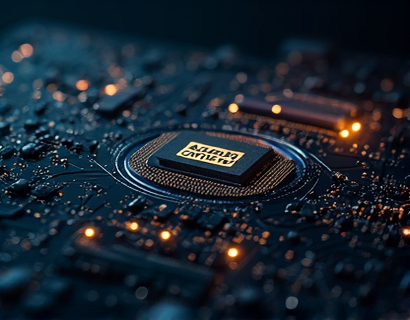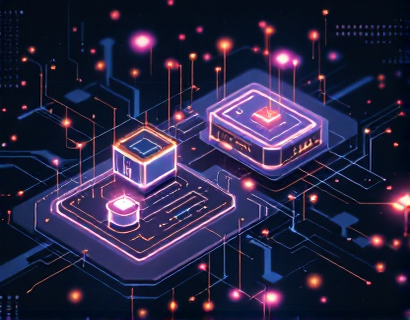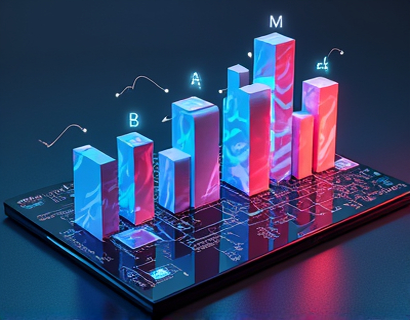Blockchain Oracle Management: Elevating Decentralized Applications with Advanced Data Integration and Smart Contract Solutions
In the rapidly evolving landscape of blockchain technology, the integration of advanced data sources and smart contract functionalities is pivotal for the development of robust and efficient decentralized applications. This comprehensive guide delves into the critical role of blockchain oracle management and smart contract solutions, focusing on how these elements can transform the way decentralized applications operate. By optimizing data integration and enhancing security, developers and businesses can unlock the full potential of blockchain, ensuring seamless and reliable interactions within decentralized ecosystems.
Understanding Blockchain Oracles
Blockchain oracles serve as a bridge between the blockchain and external data sources. They play a crucial role in feeding real-time data into smart contracts, enabling these contracts to make informed decisions based on external information. Without oracles, smart contracts would be limited to the data stored on the blockchain, which is often static and insufficient for dynamic applications. Oracles can provide a wide range of data, from market prices and weather conditions to sensor data and identity verification, making them indispensable for the functionality and utility of decentralized applications.
The Importance of Oracle Management
Effective oracle management is essential for the seamless operation of decentralized applications. It involves the selection, integration, and monitoring of oracles to ensure that the data fed into smart contracts is accurate, timely, and secure. Poor oracle management can lead to data inconsistencies, security vulnerabilities, and operational inefficiencies, all of which can undermine the trust and reliability of blockchain-based systems. Therefore, developers and businesses must adopt advanced oracle management strategies to optimize their decentralized applications.
Advanced Data Integration Techniques
One of the key benefits of advanced oracle management is the ability to integrate diverse data sources seamlessly. This involves not only collecting data from various external APIs but also ensuring that this data is consistent, reliable, and compatible with the blockchain environment. Techniques such as data normalization, real-time data synchronization, and error handling are crucial in this process. By implementing these techniques, developers can create decentralized applications that leverage a wide array of data sources, enhancing their functionality and user experience.
Data Normalization
Data normalization is the process of structuring data in a consistent manner, reducing redundancy and improving data integrity. In the context of oracle management, normalizing data from different sources ensures that the information fed into smart contracts is uniform and easily processable. This involves defining standard data formats, handling different data types, and resolving conflicts that may arise from varying data sources. Normalized data not only simplifies the integration process but also enhances the overall performance of smart contracts.
Real-Time Data Synchronization
Real-time data synchronization is another critical aspect of advanced data integration. Decentralized applications often require up-to-date information to function effectively, and oracles must be capable of providing this data in real time. This involves setting up mechanisms that continuously monitor external data sources and update the blockchain with the latest information. Techniques such as WebSocket connections, polling, and event-driven architectures can be employed to achieve real-time synchronization, ensuring that smart contracts always have access to the most current data.
Error Handling and Data Validation
Robust error handling and data validation are essential for maintaining the reliability of decentralized applications. Oracles must be designed to handle various types of errors, such as network issues, API failures, and data inconsistencies. Implementing comprehensive error handling mechanisms ensures that the application can gracefully handle unexpected situations without compromising the integrity of the smart contracts. Additionally, data validation techniques, such as schema validation and cross-referencing with multiple sources, help ensure that the data fed into smart contracts is accurate and trustworthy.
Enhancing Smart Contract Functionality
Advanced oracle management not only improves data integration but also significantly enhances the functionality of smart contracts. By providing reliable and real-time data, oracles enable smart contracts to perform complex operations and make informed decisions. This opens up a wide range of possibilities for decentralized applications, from decentralized finance (DeFi) platforms to supply chain management systems and beyond.
Decentralized Finance (DeFi)
In the DeFi space, oracles play a vital role in connecting smart contracts with external financial data. For instance, price oracles are crucial for decentralized exchanges (DEXs), enabling fair and transparent trading by providing real-time market prices. Similarly, interest rate oracles can automate lending and borrowing processes by dynamically adjusting rates based on market conditions. By integrating reliable oracles, DeFi platforms can offer more sophisticated and user-friendly services, attracting a broader range of users and increasing adoption.
Supply Chain Management
Supply chain management is another area where advanced oracle management can bring significant benefits. By integrating oracles that provide real-time data on inventory levels, shipping statuses, and quality assessments, blockchain-based supply chain solutions can enhance transparency and traceability. Smart contracts can automatically trigger actions based on this data, such as releasing payments upon delivery confirmation or initiating quality checks. This not only streamlines operations but also builds trust among all parties involved.
Identity and Authentication
Oracles can also be used to enhance identity and authentication processes in decentralized applications. By integrating with external identity verification services, oracles can provide smart contracts with reliable user authentication data. This is particularly important for applications that require strict compliance with regulatory standards, such as Know Your Customer (KYC) and Anti-Money Laundering (AML) regulations. By ensuring that user identities are verified and up-to-date, decentralized applications can operate more securely and compliantly.
Security Considerations in Oracle Management
While oracles are essential for the functionality of decentralized applications, they also introduce potential security risks. Ensuring the security of oracle data and the overall system is paramount. Several strategies can be employed to mitigate these risks and enhance the security of oracle-managed decentralized applications.
Decentralized Oracle Networks
One effective approach to improving security is the use of decentralized oracle networks. Instead of relying on a single oracle, these networks aggregate data from multiple sources, reducing the risk of manipulation or failure. By consensus, the network can determine the most accurate and reliable data to feed into smart contracts. This decentralized approach not only enhances security but also increases the resilience of the system against attacks.
Cryptographic Techniques
Cryptographic techniques play a crucial role in securing oracle data. Implementing encryption for data transmission and storage ensures that sensitive information remains confidential and tamper-proof. Additionally, using cryptographic signatures can verify the authenticity of data provided by oracles, preventing fraudulent activities. These measures help build trust in the data fed into smart contracts, ensuring that the decentralized application operates securely.
Auditing and Monitoring
Regular auditing and monitoring of oracle networks are essential for maintaining security. Developers should implement continuous monitoring tools to detect and respond to potential security threats in real time. Auditing involves periodic reviews of the oracle's performance and security measures, identifying vulnerabilities and ensuring compliance with best practices. By staying vigilant and proactive, developers can safeguard their decentralized applications against emerging threats.
Case Studies and Real-World Applications
To illustrate the practical benefits of advanced oracle management and smart contract solutions, let's explore a few real-world case studies.
Case Study 1: Decentralized Prediction Markets
Decentralized prediction markets leverage oracles to provide real-time data on various events, allowing users to place bets on outcomes. A notable example is the use of oracles in platforms like Augur, which integrates with external data sources to offer accurate and up-to-date information for prediction markets. By ensuring that users have access to real-time data, these platforms enhance the fairness and reliability of betting outcomes, attracting a wider user base and increasing engagement.
Case Study 2: Decentralized Insurance
In the realm of decentralized insurance, oracles can play a critical role in automating claims processing. For instance, in parametric insurance products, oracles can provide real-time data on events such as natural disasters, triggering payouts based on predefined conditions. This not only speeds up the claims process but also reduces the risk of fraud. Platforms like Nexus Mutual use oracles to automate and secure insurance contracts, demonstrating the potential of advanced oracle management in the insurance industry.
Case Study 3: Supply Chain Transparency
Supply chain management platforms like Provenance utilize oracles to provide end-to-end transparency and traceability. By integrating oracles that feed real-time data on product origins, quality, and movement, these platforms ensure that all stakeholders have access to accurate and verifiable information. This enhances trust and accountability in the supply chain, making it easier for consumers to make informed decisions and for businesses to comply with regulatory requirements.
Future Trends and Innovations
The field of blockchain oracle management is rapidly evolving, with several emerging trends and innovations poised to further enhance the capabilities of decentralized applications.
Cross-Chain Interoperability
As the blockchain ecosystem grows, the need for cross-chain interoperability becomes increasingly important. Future oracle solutions will likely focus on enabling seamless data exchange between different blockchain networks. This will allow decentralized applications to leverage data from a broader range of sources, enhancing their functionality and reach. Cross-chain oracles will play a crucial role in this ecosystem, facilitating the integration of diverse blockchain environments.
AI and Machine Learning Integration
The integration of artificial intelligence (AI) and machine learning (ML) with oracle management is another exciting frontier. AI and ML can be used to predict data trends, detect anomalies, and optimize data retrieval processes. For example, ML algorithms can analyze historical data to forecast future values, reducing the reliance on real-time data for certain applications. This not only improves efficiency but also enhances the accuracy of smart contract decisions.
Enhanced User Interfaces
Improving the user experience is a key focus for future oracle management solutions. Developing intuitive and user-friendly interfaces will make it easier for developers and businesses to integrate oracles and manage their decentralized applications. This includes visual dashboards for monitoring oracle performance, real-time data visualization, and simplified configuration tools. By enhancing the user experience, these innovations will encourage wider adoption and more sophisticated use cases.
Conclusion
Blockchain oracle management and smart contract solutions are fundamental to the advancement of decentralized applications. By optimizing data integration and enhancing security, these technologies enable real-time, secure, and reliable interactions within blockchain ecosystems. As the field continues to evolve, developers and businesses have the opportunity to unlock new possibilities and drive innovation. Embracing advanced oracle management strategies is essential for building robust and efficient decentralized applications that can thrive in the dynamic world of blockchain technology.










































